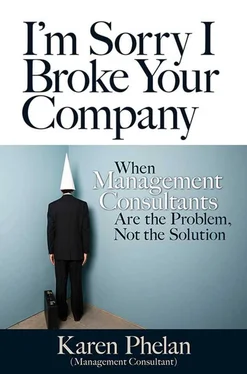Karen Phelan - I'm Sorry I broke Your Company
Здесь есть возможность читать онлайн «Karen Phelan - I'm Sorry I broke Your Company» весь текст электронной книги совершенно бесплатно (целиком полную версию без сокращений). В некоторых случаях можно слушать аудио, скачать через торрент в формате fb2 и присутствует краткое содержание. Город: San Francisco, Год выпуска: 2013, ISBN: 2013, Издательство: Berrett-Koehler Publishers, Жанр: management, popular_business, на английском языке. Описание произведения, (предисловие) а так же отзывы посетителей доступны на портале библиотеки ЛибКат.
- Название:I'm Sorry I broke Your Company
- Автор:
- Издательство:Berrett-Koehler Publishers
- Жанр:
- Год:2013
- Город:San Francisco
- ISBN:978-1-60994-740-8; 978-1-60994-741-5
- Рейтинг книги:3 / 5. Голосов: 1
-
Избранное:Добавить в избранное
- Отзывы:
-
Ваша оценка:
- 60
- 1
- 2
- 3
- 4
- 5
I'm Sorry I broke Your Company: краткое содержание, описание и аннотация
Предлагаем к чтению аннотацию, описание, краткое содержание или предисловие (зависит от того, что написал сам автор книги «I'm Sorry I broke Your Company»). Если вы не нашли необходимую информацию о книге — напишите в комментариях, мы постараемся отыскать её.
I'm Sorry I broke Your Company — читать онлайн бесплатно полную книгу (весь текст) целиком
Ниже представлен текст книги, разбитый по страницам. Система сохранения места последней прочитанной страницы, позволяет с удобством читать онлайн бесплатно книгу «I'm Sorry I broke Your Company», без необходимости каждый раз заново искать на чём Вы остановились. Поставьте закладку, и сможете в любой момент перейти на страницу, на которой закончили чтение.
Интервал:
Закладка:
The times when I've been successful at improving supply-chain operations are the times when I got all the people together to negotiate priorities and determine what trade-offs to make. Of course, it helps if they know whether the company's overarching goal is low cost or high customer service. But given the direction — emphasis is on direction and not directive — humans are usually able to judge what to do. Funny thing, when you remove human judgment from decision making, you get decisions that are not judicious. The point of improving operations is not to remove human judgment from the operations but to improve the human judgment that runs the operations. (Yes, sometimes that judgment needs a lot of improving.)
The important thing to realize about metrics is that they are a means, not an end. Numerical targets have been a disaster because they have supplanted the objectives the company really wants. Measures were supposed to help you manage, not become the way you manage. Tying them into incentive systems with punitive ramifications means the metrics have become the ends. The easiest way to illustrate this point is by using a weight-loss example. Most people can relate to the need to lose weight. Let's compare the goal «Lose twenty-five pounds in six months» to «Improve my overall health and fitness.» Businesses would choose the time-bound, measurable goal. Yet this goal can lead to all kinds of health issues. To achieve this goal, you could diet, but afterward, you'd likely gain the weight back. If you choose to exercise, then you run the risk of gaining weight by building muscle because muscle weighs more than fat. If you aren't anywhere near your target weight at five months, you may become tempted to starve yourself. This has the harmful effect of ruining your metabolism, making you more prone to weight gain. Or you may try a more extreme form of exercising, which makes you more prone to injury.
The second goal allows you to use whatever metrics you choose — weight loss, clothing size, body mass index, miles run, weights lifted — to monitor your progress. It doesn't allow you to cheat your way to the goal by sacrificing your health, which is essentially what many short-term corporate goals do. The second goal is all about long-term lifestyle changes. And the absolutely best part about the goal is that it is not time bound nor achievable. You have to constantly work at it! You will never get there! That's what continuous improvement is all about.
The biggest irony of this whole measurement madness is that by insisting a lofty, intangible, continuous goal is unattainable and replacing it with a measurable, time-bound goal, you are actually ensuring that you will never achieve the first goal because you have replaced it with a different goal. The balanced scorecard and accompanying array of metrics don't help achieve an overarching goal; they replace the goal you want with ones that you don't. A company that wants to create new and innovative consumer electronics products will be advised to state this in measurable terms, like «create x many new and innovative products by year-end.» This scenario is comparable to our weight-loss-versus-healthy-lifestyle goals — these are two completely different ends! In the second case, the most important parts of the goal are the how many and by when . The whole new and innovative part takes a backseat. The likely result will be a slew of new but not really innovative products — exactly the opposite of what the company wants. What bothers me most are all the corporate mission statements that seek to achieve measurable gains in market share or revenues or some other financial goal. Is that really what the management team and shareholders want? Or do they want a vital, healthy company that's going to be around for a while?
The simplest way to solve this measurement madness is to decouple the metrics from incentive compensation and any other kind of rewards and punishments. This way the goals don't have to be measurable, and the company can actually pursue the goals it really wants, not the substitute, short-term goals that meet the measurement criteria. Measures can be used to provide insight and improve knowledge, but they shouldn’t be the goals themselves nor should they become the management system. Measures can't make good decisions. Only people can make good decisions. And the way to help people make good decisions is to ensure that they understand the company’s overall goals and priorities and that they have the tools and knowledge to help them improve their judgment. Measurements can probably help with that, but replacing management with measurement is nothing short of measure-mental.
I have updated the PowerPoint slides that I use when discussing metrics:
People manage to the measures!
Sometimes they even manipulate the measures!
A metrics scorecard acts like a cars dashboard.
If you watch it instead of the road, you will crash!
4. Standardized Human Asset Management Is a SHAM
How Performance Management Demoralizes the Performers
While the '80s and '90s saw the rise of strategy and process consulting, the new millennium brought with it a focus on human asset management. The last piece of the command-and-control structure of the strategy, processes, and metrics framework is the people required to enact it. Although «human asset management» and «human capital management» were the original names given to the practice of managing a company's people, they have largely been replaced with «talent management» due to the industrial connotations of human assets. Some people don't react well to being labeled similarly to a line item on a balance sheet. However, the legacy of that term is the ubiquitous corporate declaration of «People are our greatest asset!» which you’ll find on every company website and in every annual report.
Human asset management systems include a slate of human resources processes and methods, including performance management, incentive compensation, competency development, career planning, leadership development, career and leadership coaching, succession planning, and learning management. In this chapter, I will cover only performance management and incentive compensation, and I will discuss other aspects of HAM in the next three. (I couldn't resist the SHAM title.)
Even though the fields of strategy development and process reengineering consulting are crowded, I am often overwhelmed by the multitudes of consulting, coaching, and software companies offering solutions for all your talent management needs. I hate the copy on these companies'websites and in talent management promotional materials because it has such a dire tone urging use of these systems. Much of this tone can be traced back to the book The War for Talent published in 2001 by three McKinsey consultants who coined the term «the talent war.» The book was written during the dot-com bubble with the premise that because aging baby boomers would leave the workplace faster than young people could enter it, companies would have a talent crisis in the upcoming decades wherein they would not be able to fill vital leadership roles. Of course, the authors didn't predict the economic crisis of 2008 wherein young people wouldn’t be able to enter the workforce at all. (I'm trying really, really hard not to say «You can't predict the future!» Oh, darn.)
However, despite the high unemployment rate, the tone of crisis still exists, and without this set of methods and practices in place, a company will be unable to identify and groom future leaders, will lose all It's best people to competitors, and will eventually shrivel up and die. It reminds me of the tone of many parenting magazines that play on mothers' fears — if you don't follow the recommended practice, your baby will be in danger. You don't want to put your company in danger, do you? I think the reason the written material has such emotional urgency is because rationally, many of these methods make no sense.
Читать дальшеИнтервал:
Закладка:
Похожие книги на «I'm Sorry I broke Your Company»
Представляем Вашему вниманию похожие книги на «I'm Sorry I broke Your Company» списком для выбора. Мы отобрали схожую по названию и смыслу литературу в надежде предоставить читателям больше вариантов отыскать новые, интересные, ещё непрочитанные произведения.
Обсуждение, отзывы о книге «I'm Sorry I broke Your Company» и просто собственные мнения читателей. Оставьте ваши комментарии, напишите, что Вы думаете о произведении, его смысле или главных героях. Укажите что конкретно понравилось, а что нет, и почему Вы так считаете.












